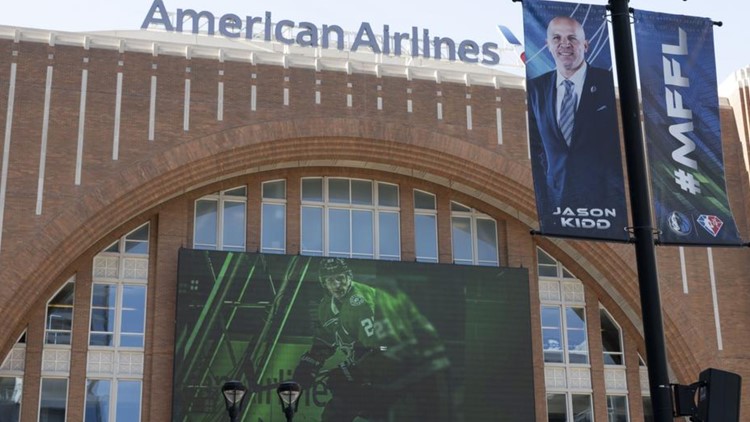DALLAS — Read this story and other North Texas business news from our content partners at the Dallas Business Journal
If Dallas Stars CEO Brad Alberts has his way, the NHL team will continue playing at the American Airlines Center for years to come.
The 21-year-old arena's future remains an open question after Dallas Mavericks owner Mark Cuban put the NBA franchise's odds of staying at its long-time home at "less than 50%" during an interview with The Dallas Morning News last fall. He said he eyes the possibility of building a new arena.
Like the Mavericks, the Stars have also played at the American Airlines Center since it replaced the old Reunion Arena. The leases for both teams end in July 2031. Unlike Cuban, Alberts said he would prefer to stay at the AAC.
"We think it's a great place to play for a long time," Alberts said in a recent interview with the Business Journal. "We love this location; we love being in the city of Dallas. At the same time, it's more than 20 years old. and it's no different than a house that's 20 years old. It's got great bones. It doesn't need to be torn down, but it needs a renovation. It needs interior finish-outs and needs some new facelifts."
A boom-time for building new sports arenas
A stadium- and arena-building boom is underway across the country as team leases come up for renewal. The privately funded $5 billion SoFi Stadium — home of the NFL's Los Angeles Rams and Los Angeles Chargers — opened in 2020. The Las Vegas Raiders' Allegiant Stadium also opened in 2020 at a final cost of $1.9 billion, including $750 million in public funding. The Buffalo Bills are getting a new $1.4 billion stadium in upstate New York that will receive $850 million in public funding. The Tennessee Titans and MLB's Kansas City Royals are also eyeing new stadiums.
In the NBA, the Golden State Warriors opened the privately financed Chase Center at the cost of $1.4 billion in 2019. The Philadelphia 76ers recently unveiled plans to build a new privately financed $1.3 billion arena.
Potential improvements for the American Airlines Center
Instead of building a new facility, Albert said costs could be saved by investing in improvements to renovate the AAC and make it last another 25 years. His idea isn't unprecedented. Maryland lawmakers approved a deal earlier this year to give a state agency the authority to issue $1.2 billion in debt for renovating the homes of the Baltimore Orioles and Baltimore Ravens instead of building new stadiums.
Alberts said that improvements at the AAC could include elements to "upgrade the fan experience," such as new clubs, concessions and technology.
"For example, our concessions haven't been touched since the building was built," Albert said. "If you redid our concessions, you would create an entirely different environment for food and beverage purchasing, and to the user, that would seem like a really big deal."
The arena could also get new revenue-generating areas such as spaces for sports betting if Texas lawmakers ever legalize it.
Overall, Alberts estimated the cost for renovating the AAC would range between $200 million to $500 million, depending on what officials decide.
"Depending on what you do and the level you do it at, you can almost create the feeling of a brand new experience when you get it done," Alberts said.
The AAC has the room for improvements
Bryan Trubey, a senior principal at Overland Partners, helped design the AAC while working at HKS Inc. He described the AAC as "one of the most important civic assets for the entire North Texas region" because of how it catalyzed the development of Victory Park. Like Alberts, Trubey believes the AAC could be renovated for several more decades.
The AAC was the largest arena by square footage in the U.S. when it opened. Trubey said the arena was designed with enough space so that improvements could be made in the future.
"One of the reasons venues like American Airlines Center can be valuable, and made even more valuable, is because we have the right footprint," Trubey said. "We have a lot of space in there to redevelop because the market changes and the fan environment changes, just like it changes in any consumer-related environment. What I want the next time I buy something is going to evolve. What I buy as a season ticket holder one decade is going to evolve in the next decade."
The Mavericks declined to make Cuban available for an interview but said his stance has not changed since his comments last fall. Cuban has previously expressed frustration about real estate development around the AAC and how it makes parking more inconvenient, according to The Dallas Morning News.
Even though almost nine years remain on the Mavs' and Stars' leases, Cuban has indicated a decision about the teams' future needs to be made soon because it would take several years to construct a new building.
The AAC continues to receive minor upgrades while its future remains in flux. It also remains one of the highest revenue-generating entertainment venues in the U.S. According to Pollstar, the AAC ranks fifth among arenas midway through the year, with more than $40 million in ticket sales.
Repairs are being made to the American Airlines Center's leaky roof
More than $7 million in work will be completed at the AAC this summer during the NBA and NHL offseasons, said Dave Brown, chief operating officer and general manager of the arena. The improvements include repairs to the roof that leaked twice during games last season, including during a Mavericks playoff game.
Brown said arena officials originally wanted to replace the roof in 2020, but then the pandemic happened. The repairs couldn't happen last summer because the Mavericks made it into the playoffs, which took place later than usual.
"We were unable to get to it," Brown said. "We tried to get through the season and knew we would have a window during the summer. That project is going forward and making great progress, and it should be complete by the time the Stars' season kicks off in September and when Mavs start in October."
Other capital improvements include 5G wireless internet access and replacing old equipment.
Brown declined to comment on the AAC's future or what investments he would like to see if hundreds of millions of dollars become available.
"I'm focused on maintaining the arena and having a great fan experience," Brown said. "Anything beyond that is out of my control."



